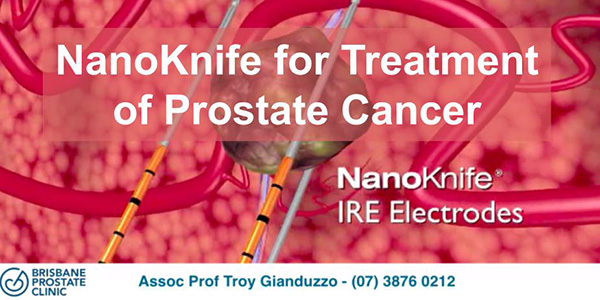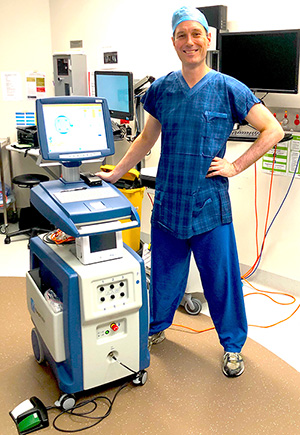
NANOKNIFE TREATMENT FOR PROSTATE CANCER
A/Prof Troy Gianduzzo performs Nanoknife for treatment of Prostate Cancer
What is a NanoKnife Procedure?
The Nanoknife is a painless and minimally invasive surgical technique used in the treatment of prostate cancer.
The NanoKnife procedure also referred to as Focal Irreversible Electroporation (IRE), uses electrical pulses to destroy cancer cells within the body.
Who are Suitable Candidates for NanoKnife Therapy?
 NanoKnife Therapy is not suitable for all types of prostate cancer. Men suitable for Nanoknife treatment are carefully selected following MRI and prostate mapping biopsies.
NanoKnife Therapy is not suitable for all types of prostate cancer. Men suitable for Nanoknife treatment are carefully selected following MRI and prostate mapping biopsies.
Patients with Prostate tumours which are localised to one (sometimes two) part(s) of the prostate may be suitable.
Your surgeon will discuss your suitability for this type of Prostate Cancer treatment. Where NanoKnife surgery is offered as an option, you will be made aware that no long-term data is available.
What are the NanoKnife’s Benefits?
The NanoKnife’s precision enables surgeons to perform treatment on the cancerous part of the prostate without treating the whole gland in order to minimise side-effects.
NanoKnife technology compares favourably to other ablation technologies because it does not use heat to destroy tumour cells. Too much heat can be risky if the tumour is close to any main blood vessels.
The NanoKnife solves this problem by using short duration, focussed electric pulses to destroy the tumour. This leaves surrounding healthy cells untouched and preserving surrounding healthy tissue.
This means effective treatment of prostate cancer cells with minimal side effects.
NanoKnife Procedure For Prostate Cancer
Nanoknife is especially useful in the treatment of prostate cancer as it can help maintain the prostate’s important functions, whilst attacking the cancerous cells.
During the NanoKnife surgery, electrodes are placed within the cancerous tissue and a series of high voltage, direct current electrical pulses are passed between them.
This current generates an electric field that causes the formation of pores or defects in the cell membranes leading to cell death.
Preparation for NanoKnife Therapy
Your surgeon will explain the procedure and answer any questions you may have.
Preparation will include information on:
- How long you should avoid eating and drinking beforehand,
- Whether MRI or PET scans are required to determine the size, shape and location of your tumour,
- What medications would need to stop prior to the procedure, and
- Any other post operative planning information that is required.
Like all procedures, there are risks or side effects involved. Your surgeon will explain these to you.
During A NanoKnife Procedure
A NanoKnife procedure is usually performed under general anaesthesia.
- Usually four to five thin needles are inserted into the tumour
- Under ultrasound guidance, the short electrical pulses can be administered to exactly the right area
- An electric current is then passed through the needles for about two minutes.
- The entire procedure may be completed within 45 minutes.
As the NanoKnife is minimally invasive it offers shorter post-operative recuperation period and requires a short hospital stay. Patients are monitored in the hospital and discharged home after 5 or so days.
Post-op Recovery of the NanoKnife Procedure
Because the NanoKnife procedure is not invasive, recovery time is generally short and limited to a few days. Post-operatively, patients can require a catheter for a few days.
After treatment, adjacent non-cancerous cells migrate in and replace the dead cancer cells. There is some evidence that healthy cells grow back and regenerate instead of leaving a hole in the organ allowing the organ to continue to function.
Post NanoKnife Follow-Ups
Post Operative follow-up appointments are required. Post-Operative tests would also be required and include:
- MRI scan to confirm that your tumour is shrinking,
- Repeat biopsies,
- Ongoing PSA Pathology testing.
Your surgeon will let you know if any further treatment is required.
They'll also let you know when you can get back to your normal routine, including work.
Risks and Complications with NanoKnife Procedure
Based on the published data, the NanoKnife procedure is very safe and has a very low complication rate. Patients can expect to experience minimal to no side effects at all.
Some men may be infertile due to decreased/absent ejaculatory fluid.
No long-term data are available on side-effects and outcomes.




